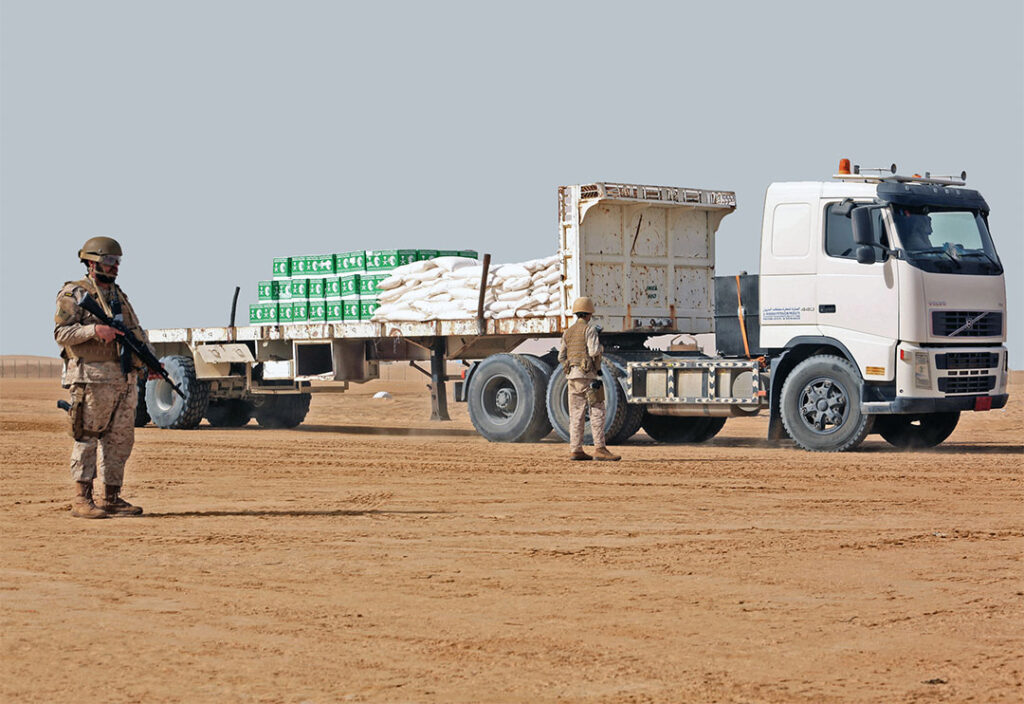Saudi Arabia Uses Military and Humanitarian Aid to Oppose Iran’s Campaign of Misery in Yemen
Brig. Gen. TURKI BIN SALEH AL-MALIKI
SPOKESMAN FOR THE ARAB COALITION TO RESTORE LEGITIMACY IN YEMEN
The Saudi Ministry of Defense has developed a distinct media communication strategy, based on transparent communication and providing necessary information about military operations designed to restore legitimacy in Yemen. In July 2017 I had the honor of being appointed as official spokesman of the Saudi-led Arab Coalition to Restore Legitimacy in Yemen, a position from which our forces can communicate with the media credibly and transparently and shape public opinion about events in the region.
My office has widened its initial mandate. We hold weekly press conferences, conduct media interviews and issue urgent press briefings in accordance with the progress of military and humanitarian operations. Not only that, but it has been my job to expose the disinformation and lies of Houthi gangs. On the media battlefield, the action rarely ceases, particularly when you are obliged to confront an enemy that changes colors like a chameleon, one with a multipronged approach to terrorism and criminal behavior, undeterred by religion or values in its attempts to undermine peace and security, and eager to distort facts and incite hatred.
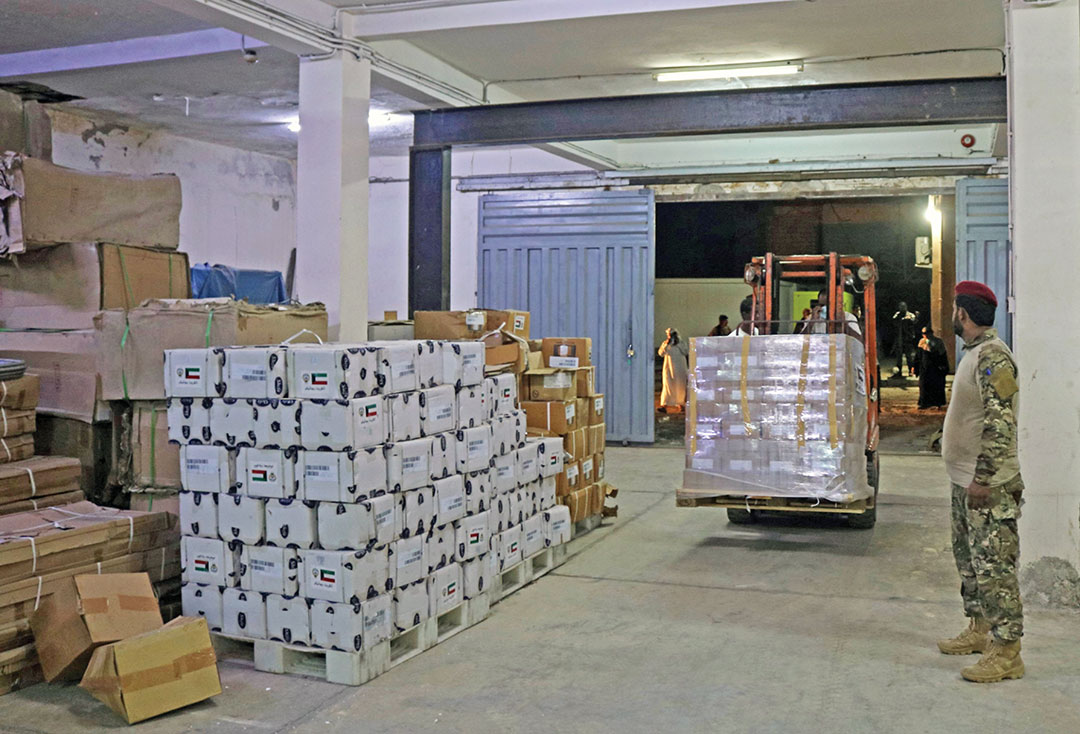
Houthi disinformation
Like other Iranian-sponsored militias, the Houthis have adopted an Iranian label for the instrument amplifying their propaganda in the media, Al-I’lam Al-Harbi (War Media), which undertakes mobilization, propaganda and incitement efforts for the group. Falsification, fabrication and disinformation have become a big industry for the Houthis and follow the doctrines of Joseph Goebbels, the Nazi minister of propaganda under Adolf Hitler. Goebbels said, “If you tell a big enough lie and keep repeating it, people will eventually come to believe it.” The Houthis use innumerable methods in their media disinformation. They lie, obscure facts, twist statements, make up news stories, repeat fabrications to make them appear true, and spread rumors and falsehoods in areas under their control.
Worse still, the Houthis attack sources of the truth when they fail to hide unfavorable news. For example, the Houthis have blocked many dissenting news sites, closed television channels and newspapers, and taken control of the headquarters of Yemeni media institutions, confiscating their contents. Not only that, but the Houthis have attacked journalists and social media activists who oppose them, threatening them with arrest or expulsion.
I want to stress that the Arab coalition’s Joint Forces Command (JFC) is committed to implementing the highest targeting standards as well as the principles and customary rules of international humanitarian law in military operations. The JFC takes every action to address incidents, noting that Houthi attacks threaten not only Saudi Arabia but the global economy. After every Houthi attack, I hold a press conference and briefing in which I clearly explain the Royal Saudi Air Defense Forces’ surveillance of ballistic missile launches from inside Yemeni territory toward Saudi Arabia, how these missiles target residential areas, and how they are intercepted and destroyed without casualties.
I would like to emphasize that Houthi militias receive instructions from Iran’s Revolutionary Guard, which continues to provide them with rockets and other weapons. Houthi ballistic missile launches have recently intensified after Iran supplied the militias with launch pads for them. In recent years, U.S. warships have intercepted and seized Iranian weapons destined for the Houthis. Under a United Nations resolution, Tehran is prohibited from providing, selling or transferring weapons outside the country unless it receives approval from the U.N. Security Council. A separate U.N. resolution on Yemen prohibits the provision of weapons to Houthi leaders. Two separate U.N. Security Council Resolutions — Nos. 2216 (April 2015) and 2266 (February 2016) — stipulate that member states take “necessary measures” to prevent the transfer of weapons to the Houthis and their local allies.
The Arab coalition in Yemen has gathered conclusive evidence that Iran is supplying the Houthis with remote-detonated autonomous vehicles that can be programmed to advance along a specific path or be directed toward a target using a photoelectric guidance system. Iranian-backed Houthi terrorist militias continue to violate international humanitarian law by targeting civilian dignitaries and ordinary residents in Saudi Arabia and Yemen via drones. Iranian arms and support for Houthi terrorist militias threaten regional and international security.
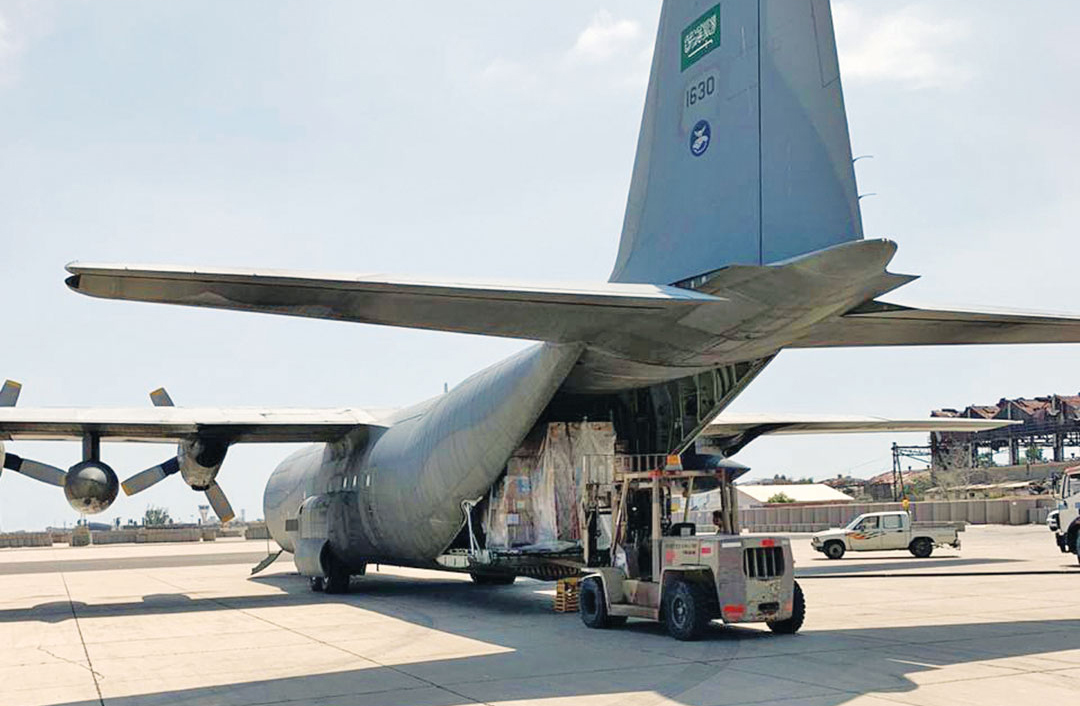
Arab Coalition relief efforts
Since taking control of the Yemeni capital of Sanaa, Houthi militias have blackmailed local and international aid organizations and looted aid or imposed levies on every project carried out. Many humanitarian workers complain that the Houthis are seeking to control the flow of aid and donations to Yemen, which has suffered from the world’s worst humanitarian crisis since the militias ignited a war in late 2014 following their coup against the country’s legitimate government.
Regarding Yemen’s 2019 Humanitarian Response Plan, Saudi Arabia, the United Arab Emirates (UAE) and Kuwait pledged a total of $1.75 billion, including $500 million for food security. Since 2019, Saudi Arabia and the UAE have continued to be the largest donors in support of the humanitarian aid. The Houthis try to use humanitarian crises as cover before the international community to intimidate Yemeni society and increase suffering through indiscriminate taxation and depriving the Yemeni people of humanitarian aid inside the country.
Confirming its support for the Yemeni people, the coalition runs humanitarian aid convoys in addition to airlifting Yemeni patients out of Sanaa. This is part of humanitarian and relief efforts to stand with the fraternal people of Yemen and alleviate the suffering of ill patients requiring treatment, as well as those with incurable diseases. The aircraft used in the air bridge are known as “planes of mercy.”
Beyond matters of combat, Saudis also provide medical relief for wounded Yemeni Soldiers. Thousands of Yemeni wounded have received such care both at home, through private Yemeni hospitals and specialized clinics, and abroad by sending them to other countries for treatment, according to statistics from the King Salman Humanitarian Aid and Relief Center (KSRelief). Through its humanitarian arm, KSRelief spans more than 36 countries.
In past years, the coalition has worked to treat more than 21,000 injured Yemenis under the umbrella of KSRelief, inside and outside Yemen. My country has established “homes for the wounded” — housing allocated to Yemenis who require prolonged treatment. In this way, the coalition has treated 12,795 wounded Yemenis in Saudi Arabia alone.
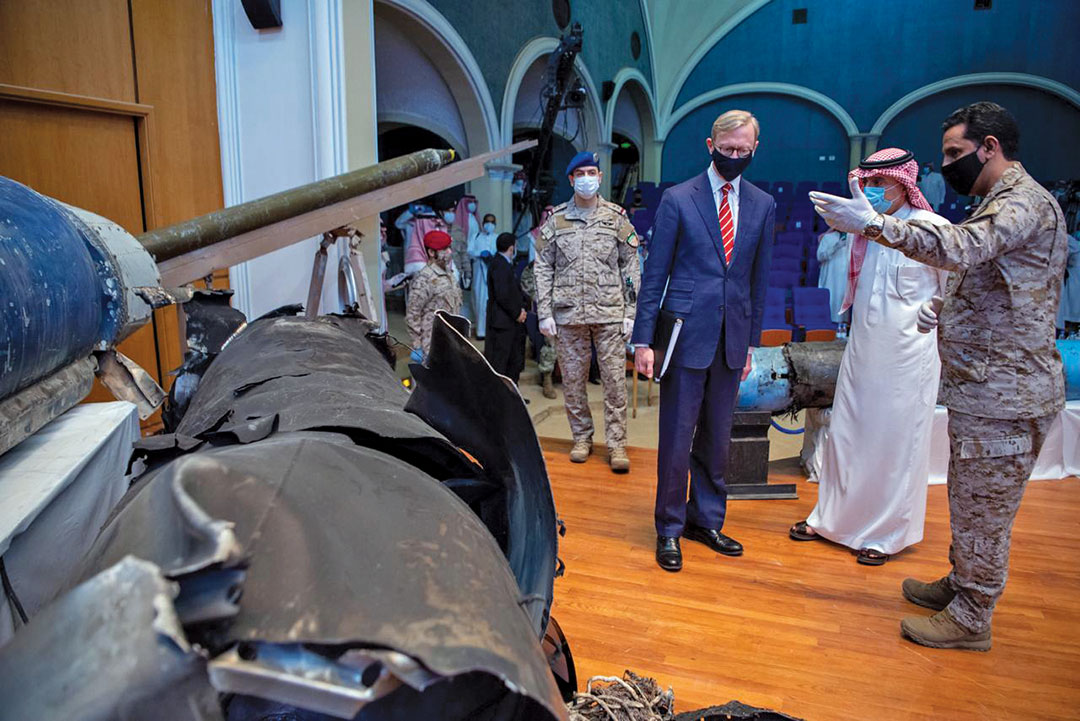
These figures speak to the level of importance and care Saudi Arabia has given to wounded Yemenis affected by the war and coup launched by the Houthis. There are 5,725 wounded Yemenis in private-sector hospitals in Yemen. About 1,000 cases have been treated in medical centers specializing in eye injuries, 534 wounded have been treated in Jordan, 280 in Sudan and one in India.
Aside from tending the wounded, Saudi Arabia has launched 120 health projects in Yemen worth more than half a billion dollars over the past four years. We have established a prosthetic center at Marib General Hospital and financed a project to benefit Yemen in the World Health Organization, while also combating dengue fever and cholera epidemics that have been rampant in the country. Saudi Arabia has also provided medical personnel to support Yemeni hospitals, setting up and operating Marib Hospital, Al-Jumhouri Hospital in Aden, Al-Saudi Hospital in Hajjah, and Al-Salam Hospital in Sa’ada.
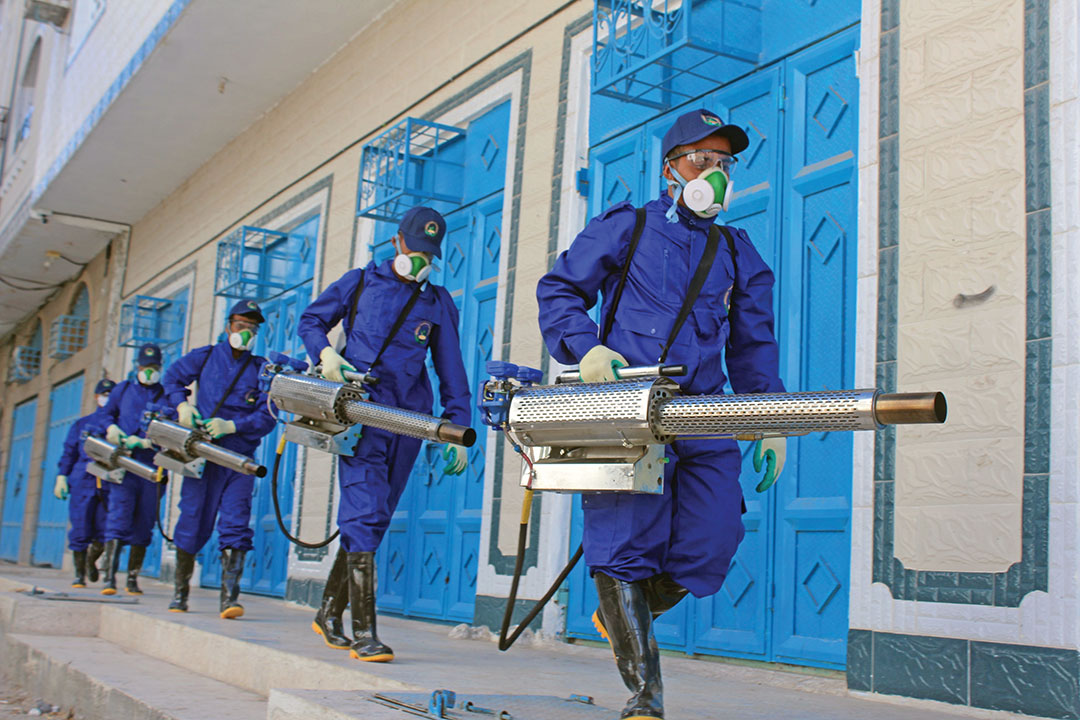
On the basis of its humanitarian role, JFC has launched a number of urgent relief campaigns and established air bridges to provide relief and humanitarian assistance to conflict-affected people in Yemeni provinces, with the aim of alleviating the suffering of affected individuals with the participation of KSRelief and the Saudi Program for the Development and Reconstruction of Yemen. To alleviate Yemeni suffering, relief campaigns provide food, medical supplies and building materials; open roads; dig wells; and maintain and repair the electrical grid.
As the world has united against the coronavirus pandemic, Iran and its Houthi militias have continued their subversion in Yemen. While citizens are dying from the coronavirus, Iran has not ceased from harnessing all its material and logistical capabilities to support terrorist arms in the region and throughout the world. The Houthis have continued their attacks in conjunction with the coalition’s declaration of a comprehensive cease-fire, underlining the Iranian-backed militias’ insistence on rejecting all peace efforts aimed at preserving Yemeni life, particularly at a time when the world is facing the threat from the coronavirus outbreak.
We support the Yemeni government’s decisions to accept the U.N. secretary-general’s call for a cease-fire in Yemen to address the spread of the coronavirus and support the bid of U.N. Special Envoy for Yemen Martin Griffith for a cease-fire, de-escalation, and practical steps to build confidence between parties at the humanitarian and economic levels.
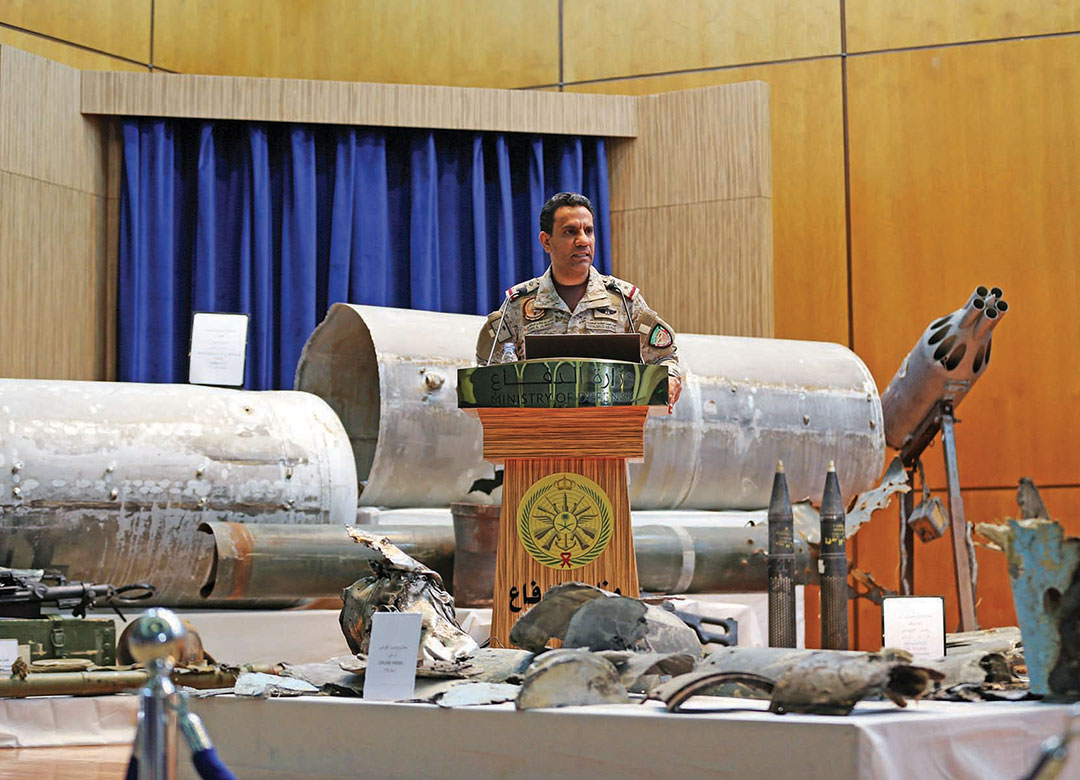
Brig. Gen. Turki bin Saleh al-Maliki, the official spokesman for the Arab Coalition to Restore Legitimacy in Yemen, received a bachelor’s in aeronautical science from King Faisal Air Academy with honors in 1997 and a master’s in military science from the Command and Staff College in 2015.
Born in Taif in 1974, Brig. Gen. al-Maliki was sent to the United States early in his career to study at the U.S. Naval Aviation School in Pensacola, Florida. He completed training on several airframes, including the T-34, T-39 and T-2, graduating in mid-2000. He also flew the F-15S at King Abdulaziz Air Base in Dhahran and King Khalid Air Base in Khamis Mushait. He continued his military career at Royal Saudi Air Force Command in the planning and operations department.
The brigadier general has broadened his knowledge through extensive coursework in the fields of advanced aviation, cyber warfare, aerospace management, air operations planning, air defense, countering weapons of mass destruction and international humanitarian law to minimize the effects of armed conflict.

